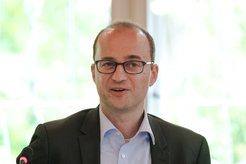New Max Planck Fellow Dirk Hanschel to Study Environmental Protection as a Human Right
Prof. Dr. Dirk Hanschel, Professor of German, European, and International Public Law at Martin Luther University Halle-Wittenberg (MLU), will carry out a research programme on “Environmental Rights in Cultural Context” as a Max Planck Fellow at the Max Planck Institute (MPI) for Social Anthropology in Halle starting in January 2019. The fellowship position, which is awarded by the Max Planck Society, is connected with a research grant of up to €500,000.

Dirk Hanschel is the first legal scholar from MLU to collaborate with the MPI for Social Anthropology as a Max Planck Fellow. His interdisciplinary project investigates the intersection of environmental protection and human rights – for example, the question of whether a healthy environment can be considered a human right. “Some countries, such as Ecuador, even have constitutional provisions that nature itself has rights,” notes the expert on international and comparative law. “This development is exciting, for it poses questions about the content of such rights and who specifically can invoke them,” Hanschel explains.
The research project “Environmental Rights in Cultural Context” will centre around case studies led by Hanschel in cooperation with MPI Director Prof. Dr. Marie-Claire Foblets. The collaboration with anthropologists and their methodologies is invaluable for the undertaking, which will investigate the ways that environmental changes due to processes like climate change or natural resource extraction affect people – for example, the inhabitants of a village in the Ecuadorian Amazon – whose entire culture is directly dependent on an intact natural environment. Linked with this is the legal question about how and to what degree constitutionally guaranteed environmental rights can offer special protection in such cases and whether they can be considered to be human rights. “In sum, the project brings together empirical observation and legal dogmatic analysis to mutually illuminate each other,” Hanschel concludes.
Dirk Hanschel studied law in Marburg, London, and Heidelberg and completed his Master of Comparative Law in Mannheim and Adelaide (Australia). He passed his qualifying state board examinations in law in the state of Rhineland-Palatinate, worked as a research assistant at the University of Mannheim, and received his doctorate with a dissertation on the topic of negotiated settlements in international environmental law. In his post-doctoral thesis (Habilitation), completed in Mannheim in 2010, Hanschel examined how the German federal state resolves conflicts in comparison with the United States and Switzerland. Subsequently he held visiting professorships at the Universities of Trier, Münster, Göttingen, Würzburg, and Hanover. From 2013 to 2015 he was a Reader at the University of Aberdeen (Scotland). In 2015 he accepted a professorship (Chair) at Martin Luther University Halle-Wittenberg.
The Max Planck Fellow Programme promotes cooperation between outstanding university professors and Max Planck Society researchers. The appointment of university professors as Max Planck Fellows is limited to a five-year period and also entails the supervision of a small working group at a Max Planck institute. (Text: Manuela Bank-Zillmann)
Studying global social change
The Max Planck Institute for Social Anthropology is one of the world’s leading centres for research in socio-cultural anthropology. It was established in 1999 by Chris Hann and Günther Schlee, and moved to its permanent buildings at Advokatenweg 36 in Halle/Saale in 2001. Marie-Claire Foblets joined the Institute as Director of the Department ‘Law & Anthropology’ in 2012.
Common to all research projects at the Max Planck Institute is the comparative analysis of social change; it is primarily in this domain that its researchers contribute to anthropological theory, though many programmes also have applied significance and political topicality. Fieldwork is an essential part of almost all projects. Some 175 researchers from over 30 countries currently work at the Institute. In addition, the Institute also hosts countless guest researchers who join in the scholarly discussions.
Contact for this press release
Prof. Dr. Marie-Claire Foblets
Max Planck Institute for Social Anthropology
Department ‘Law & Anthropology’
Advokatenweg 36, 06114 Halle (Saale)
Tel.: 0345 2927-301
E-mail: foblets@eth.mpg.de
http://www.eth.mpg.de/foblets
PR contact
Stefan Schwendtner
Press and Public Relations
Max Planck Institute for Social Anthropology
Advokatenweg 36, 06114 Halle (Saale)
Tel.: 0345 2927-425
E-mail: schwendtner@eth.mpg.de
http://www.eth.mpg.de
